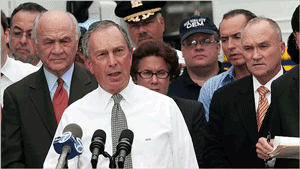 SocioTimes and Elliott Wave International have written about how bear market divergences foster third parties and independent candidates in U.S. politics. This switching by Mr. Bloomberg from Republican to independent is notable for its high profile and likely impact on the upcoming presidential elections. SocioTimes and Elliott Wave International have written about how bear market divergences foster third parties and independent candidates in U.S. politics. This switching by Mr. Bloomberg from Republican to independent is notable for its high profile and likely impact on the upcoming presidential elections.
--Tiane
We talked a little about New York City’s special status in the hearts of the public (and its corresponding disrepute in bear market phases) last Wednesday with our discussion of the conversion of an elevated rail line to a park on NYC's West Side. This is another example of how the goodwill of a long bull market is flowing through and out of the world's financial capital. Can it be anything but another sign of a top? The mayor of New York City feels so strong that he will use the office as a spring board for a presidential run. At lows, the mayor of New York is always a pitiful creature. As the article points out, with New York Senator Hillary Rodham Clinton and former New York City mayor Rudolph Giuliani already in the race, a Bloomberg entry means three of the prime candidates are New York pols.
Another aspect, is that Bloomberg’s third party candidacy explains how Clinton can win even though, as one columnist put it, “most Americans don’t like" her. With a strong independent dividing the anti-Hillary vote, Clinton can gain a plurality of the votes even if the majority of voters don't like her. WIth Bloomberg in the race as an independent, she can probably win the prize with less than 40% of the vote. Such a result would be consistent with EWI’s forecast calling for increasing political fragmentation and a Hillary victory in 2008. |
